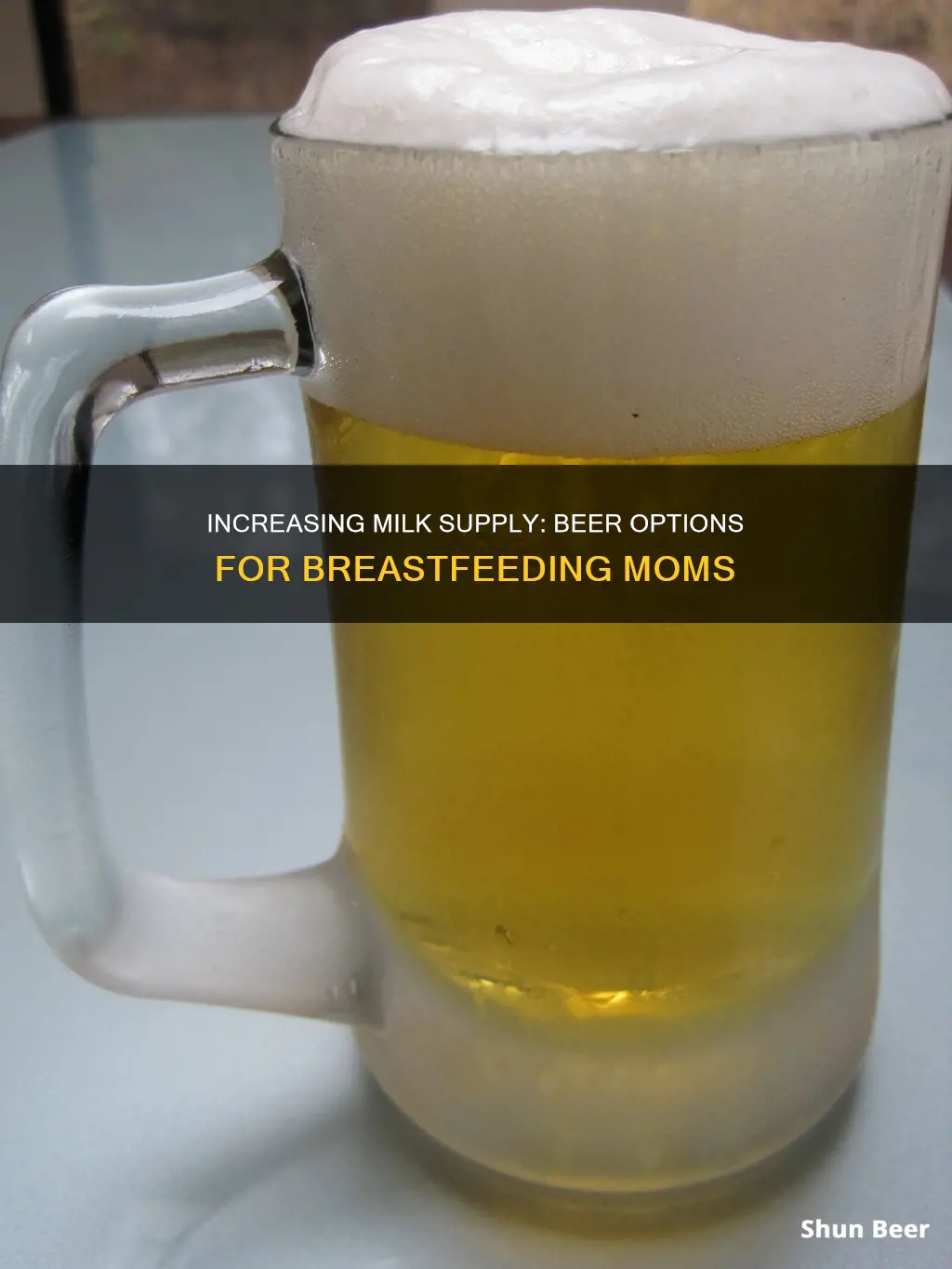
It is a widely held belief that beer can help increase breast milk supply. However, there is limited scientific evidence to support this claim. While it is true that beer contains barley, which stimulates the secretion of prolactin, a hormone responsible for milk production, it is important to note that alcohol inhibits the milk ejection reflex and can decrease milk supply. As such, non-alcoholic beers are generally recommended for breastfeeding mothers.
| Characteristics | Values |
|---|---|
| Type of beer | Non-alcoholic, European-style beer, such as Guinness Stout-0 or St. Pauli Girl |
| Amount | One 8 oz glass |
| Frequency | Once a day |
| Time | After dinner |
| Effect | May increase milk supply and lead to more frequent and stronger let-downs |
| Scientific evidence | Limited; studies suggest consuming beer may increase levels of prolactin, but these were done on non-lactating individuals |
| Safety | Alcohol is not recommended during breastfeeding as it passes directly to the baby through breast milk and may decrease milk production; non-alcoholic beers are generally considered safer |
What You'll Learn

The effect of alcohol on milk supply
The idea that beer can increase milk supply has been around for centuries. Before Prohibition, Anheuser-Busch even produced a low-alcohol brew called Malt-Nutrine, which was billed as a "sparkling non-intoxicant" and prescribed for pregnant and lactating women. However, the overall safety of alcohol consumption while breastfeeding has long been debated, and there is insufficient proof that it is safe. So, what is the effect of alcohol on milk supply?
The Effect of Alcohol on Milk Ejection
Alcohol inhibits the milk-ejection reflex and slows down the flow of milk. This means that babies may drink less milk after their mothers have consumed alcohol. One study found that breastfed infants consumed an average of 23% less milk after their mothers had just one alcoholic beer. This may be because alcohol stalls the let-down reflex and slows the flow of milk, or because infants may dislike the taste of alcohol in the milk.
The Effect of Alcohol on Milk Production
There is some evidence that alcohol may decrease milk production. Alcohol can affect the hormone oxytocin, which is necessary for the letdown step of lactation. Additionally, chronic alcohol use has been associated with early weaning and can even affect a baby's sleeping schedule. However, the negative effects of moderate alcohol intake on breast milk are short-lived, and supply levels return to normal once the alcohol has left the mother's system.
Non-Alcoholic Beer
Non-alcoholic beers may provide extra calories, which can be helpful for mothers who are having trouble maintaining their weight or accessing nutritious foods. Additionally, traditional beer ingredients such as barley, hops, and yeast are lactogenic and can support milk production. However, it is important to note that not all mothers respond to beer in the same way, and some may not notice any difference in their milk supply after consuming non-alcoholic beer.
While there may be some ingredients in beer that support milk production, the presence of alcohol in beer suppresses milk production. Therefore, any benefit mothers may get from the beer is counteracted by the amount of alcohol in the drink. As such, it is generally not recommended to consume beer for the purpose of increasing milk supply, and there are safer alternatives to try.
Warm Beer: What Brews Taste Best Unchilled?
You may want to see also

The history of beer and breastfeeding
In the past, beer was often made with different ingredients and a lower alcohol content than today's commercial beers. Traditional beers were full of grains and herbs, known as galactagogues, thought to increase milk flow. The "small beer" of yesteryear was a nutritious, low-alcohol beverage given to children, pregnant women, and breastfeeding mothers. It was believed to be a healthy drink that could also stimulate appetite and strengthen breastfeeding infants. Beer was even prescribed to breastfeeding women in the 1960s.
However, the idea that beer increases milk supply is not without controversy. Some studies suggest that consuming beer may increase levels of prolactin, the hormone responsible for milk production. But these studies were conducted on non-lactating individuals, and the rise in prolactin is caused by the barley in beer, not the alcohol. Additionally, alcohol interferes with the release of oxytocin, which can lead to a decrease in milk supply.
The overall safety of alcohol consumption while breastfeeding has been a topic of debate, with conflicting advice from different groups. It is known that alcohol passes directly from the parent to the baby through breast milk and may negatively impact the baby's sleeping schedule and development. Chronic alcohol use is also associated with early weaning.
While non-alcoholic beer, especially those rich in barley or hops, may have some lactogenic effects, it is generally recommended to avoid regular alcohol consumption during lactation. The "small beers" of the past, with their higher nutritional content and lower alcohol levels, were likely more effective in increasing milk supply than today's commercial beers.
Andre the Giant's Unbelievable Beer Drinking Capacity
You may want to see also

Lactation cookies as an alternative
Lactation cookies are a great alternative to beer for nursing mothers looking to increase their milk supply. They are made with ingredients known to help boost milk production, such as oats, brewer's yeast, flaxseed, and coconut oil. These cookies are not only delicious but also provide essential nutrients like vitamin B, iron, zinc, magnesium, and potassium.
Lactation cookies offer a convenient and tasty snack option for busy nursing mothers. They can be easily grabbed as a quick bite, especially during those hungry nights or early mornings. The recipe for lactation cookies can be customised to suit various dietary needs, including vegan, gluten-free, and dairy-free options.
While the effectiveness of lactation cookies may vary from person to person, many mothers have reported positive results. Some mothers noticed an increase in their milk supply within 1-3 days of consistently consuming these cookies. It is recommended to eat a lactation treat 1-2 hours before breastfeeding or pumping for optimal results.
It is important to note that lactation cookies should be consumed in moderation. Excessive consumption may lead to an oversupply of milk or side effects such as gas, bloating, or headaches due to the high content of brewer's yeast. Additionally, it is always advisable to consult a healthcare professional before adding new ingredients to your diet, especially when breastfeeding.
Lactation cookies provide a delicious and nutritious alternative to beer for nursing mothers looking to boost their milk supply. They are packed with ingredients beneficial for milk production and can be tailored to suit individual dietary needs. While results may vary, many mothers have experienced positive outcomes and enjoyed the convenience and taste of these cookies.
Jehovah's Witness and Alcohol: Beer Included or Forbidden?
You may want to see also

The role of barley in milk supply
Barley, a key ingredient in beer, contains a polysaccharide called beta-glucan, which has been linked to increased levels of the hormone prolactin. Prolactin is crucial for milk production, and this connection suggests a potential link between barley and enhanced lactation. Traditional wisdom and anecdotal evidence from mothers have long supported the idea that beer can boost milk supply. Some breastfeeding mothers have reported increased milk production after consuming specific types of beer, such as non-alcoholic or low-alcohol European-style beers.
However, it is important to approach this topic with caution. While barley and its beta-glucan content may influence prolactin levels, the overall effect of beer on milk supply is not solely determined by this ingredient. The presence of alcohol in beer can have counteractive effects. Studies have shown that alcohol consumption can inhibit the milk ejection reflex and even decrease milk production by impacting the hormone oxytocin. Additionally, infants may dislike the taste of alcohol in breast milk, potentially reducing their milk intake.
To summarize, while barley in beer may have a role in stimulating prolactin secretion, the overall effect of beer on milk supply is complex. The presence of alcohol can counteract the potential benefits of barley by suppressing milk production and impacting the milk ejection reflex. Therefore, it is generally recommended that breastfeeding mothers do not rely on beer as a primary method to increase milk supply and instead explore other options such as lactation cookies, teas, or supplements recommended by healthcare professionals.
The Magic Behind Beer Ripples: How Does It Work?
You may want to see also

The safety of alcohol consumption while breastfeeding
The safety of consuming alcohol while breastfeeding is a topic with limited research and conflicting advice. While it is widely recommended that alcohol be avoided during pregnancy, the effects of alcohol consumption while breastfeeding are less understood.
Alcohol passes directly from the parent to the baby through breast milk, and its consumption can inhibit the release of oxytocin, the hormone responsible for the milk ejection reflex. This can lead to a decrease in milk production and the milk ejection reflex. Additionally, alcohol can cause drowsiness, deep sleep, weakness, and abnormal weight gain in infants. It can also disrupt their sleep patterns and increase REM sleep between 3.5 and 24 hours after exposure.
The World Health Organization recommends avoiding alcohol during lactation, while other organizations suggest that occasional alcohol consumption of up to one drink per day may be acceptable if followed by a waiting period of at least two hours before breastfeeding. However, it is important to note that the long-term effects of alcohol in human milk are still unknown.
The amount of alcohol in breast milk closely parallels the parent's blood alcohol concentration, peaking around 30 to 60 minutes after consumption. The more alcohol consumed, the longer it will be present in the milk. Pumping and dumping after drinking alcohol is not necessary, as it will not speed up the elimination of alcohol from the milk or the parent's body.
It is worth noting that the effects of alcohol consumption on milk production and the infant can vary from person to person, and certain factors such as body weight and the time between consumption and breastfeeding can influence the impact.
While there is no definitive conclusion on the safety of alcohol consumption while breastfeeding, it is generally recommended to limit intake and prioritize the well-being of both the parent and the child.
Hypoglycemia and Beer: Is It Safe to Drink?
You may want to see also
Frequently asked questions
It is recommended to drink non-alcoholic beer to increase milk supply. The alcohol in beer inhibits the milk-ejection reflex and can even lead to early weaning.
The barley in beer stimulates the secretion of prolactin, the hormone responsible for milk production.
It is recommended to drink one 8 oz glass of non-alcoholic beer after dinner.
Yes, there are other drinks that can help increase milk supply, such as mother's milk tea and brewer's yeast for lactation.







